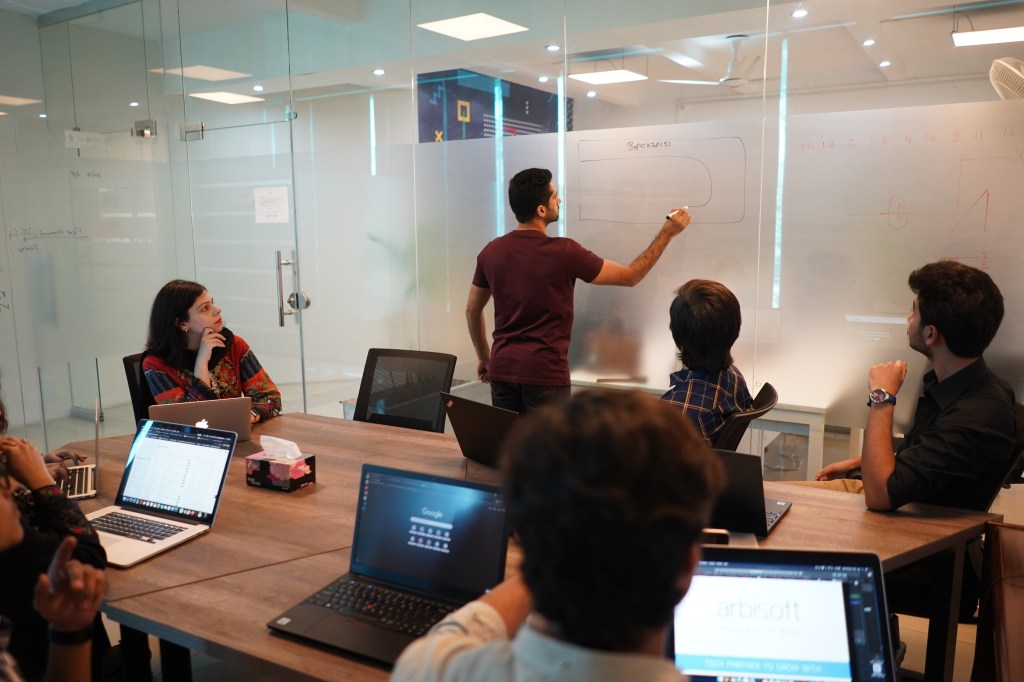Co-founded in 2007 by Yasser Bashir, Arbisoft falls on the larger end of the spectrum of software development partners that our readers have recommended in our ongoing survey.
Today, the company has a few hundred employees distributed across Pakistan, Australia, Texas and Malaysia, but it continues to service startups of all sizes, says Bashir.
Omri Traub, CEO of e-commerce startup Popcart, told TechCrunch that their company has worked with Arbisoft since its early stages.
“We had access to top talent and, importantly, elasticity in hiring. If we wanted to add a developer, we could have an incredible one join our team in under one week,” said Traub. “It would have taken us weeks and months to recruit and hire a developer in Boston or the U.S.”

According to Anna Bailey, product manager at Volta Charging, “help [from Arbisoft] has allowed us to build reliably and at a large scale without having to burden our internal engineers.”
We spoke to Bashir to learn more about how Arbisoft works with its clients, most of whom “have either closed or are about to close Series A rounds,” he said. In our conversation, he discussed agile development, data science, customer and employee satisfaction.
Editor’s note: This interview has been edited lightly for length and clarity.
Tech and VC heavyweights join the Disrupt 2025 agenda
Netflix, ElevenLabs, Wayve, Sequoia Capital — just a few of the heavy hitters joining the Disrupt 2025 agenda. They’re here to deliver the insights that fuel startup growth and sharpen your edge. Don’t miss the 20th anniversary of TechCrunch Disrupt, and a chance to learn from the top voices in tech — grab your ticket now and save up to $675 before prices rise.
Tech and VC heavyweights join the Disrupt 2025 agenda
Netflix, ElevenLabs, Wayve, Sequoia Capital — just a few of the heavy hitters joining the Disrupt 2025 agenda. They’re here to deliver the insights that fuel startup growth and sharpen your edge. Don’t miss the 20th anniversary of TechCrunch Disrupt, and a chance to learn from the top voices in tech — grab your ticket now and save up to $675 before prices rise.
Can you briefly tell us about your background and what inspired you to create Arbisoft?
Yasser Bashir: I was 10 when my father bought me and my brother a Commodore 64. In the little town that I grew up in, we were among the only three families that owned a computer. I know very few people who used one of those C-64 machines in the 80s and didn’t end up loving computers or computer science. I was no exception. I went on to get an undergraduate degree in computer science from the top CS school in my home country and later ended up at Stanford University for a graduate degree.
Each of those steps paved the way, in one way or another, toward a career in computing in general and the creation of a technology company in particular.
In 2007, I, along with a few other colleagues, founded Arbisoft because we loved solving a variety of computing problems rather than staying close to one particular domain or technology vertical. We felt it was much easier to do that in a software services company than a software product company.
In addition to our love for software development, we also had strong ideas on the kind of culture that would likely inspire smart people to do their best in a technology-focused organization. Arbisoft is a manifestation of many of those ideas.
How has Arbisoft evolved since its creation 13 years ago, and and how did it grow?
What started with three people in 2007 is now one of the most successful software companies in our region. We have almost 750 people, mostly engineering staff, and we are software development partners for many organizations that are leaders in their verticals, including KAYAK, MIT, edX, Insurify and many others.
Almost all of our growth has been organic; companies that have had a great experience of outsourcing their software development needs to us strongly recommend our services to others. Not surprisingly, we consistently get a net promoter score of 75 or above from our customers in our biannual NPS surveys. Our growth is a direct consequence of our customers promoting us to others.
Help TechCrunch find the best software consultants for startups.
Provide a recommendation in this quick survey and we’ll share the results with everybody.
How is your team structured?
Arbisoft is structured as a network of independent, cross-functional teams. Each team is typically working on just one client project at any given time. We strongly believe in autonomous, self-managed teams that are agile and constantly evolving to improve their effectiveness.
Among the many books that have shaped my thinking on organizational structures, one of the most important is Frédéric Laloux’s “Reinventing Organizations.” His concepts for Teal organizations are very ambitious — sometimes overly idealistic — but definitely paint a picture of an organization that is way more evolved than the majority of companies in the world today. In shaping our team structures, we have borrowed many ideas from the book.
What range of services do you provide? Why did you choose to go full-stack and beyond?
Our range of services, by virtue of our size, is pretty wide. We provide full-stack web and mobile app development, DevOps for cloud computing, machine learning, AI, UI/UX/product design, project management, and manual and automated software QA. Basically, we provide most, if not all, of the services that may be needed by a modern tech startup to get to a production-ready solution. Beyond launch, we continue to support our customers with maintenance, bug fixing and new feature development.
Among your clients, at what stages are the startups that you work with? How early-stage can they be?
We work with startups across all stages of their evolution, but more typically with ones that have either closed or are about to close Series A rounds. There is no restriction on the startup stage as such though. For the right idea, we can start at its very inception.
How do you build trust with your clients that make them potentially willing to rely on Arbisoft for all of their engineering needs?
Openness and transparency are fundamental enablers of the trust our clients have in us. We make sure we represent our capabilities exactly how they are so that we can set the right expectations and exceed them whenever possible. Our teams working on client projects are seamlessly embedded into the clients’ own teams and, for all practical purposes, work as if they are a part of the clients’ business.
Vulnerability also plays a role in building that trust — when we make mistakes, we are open about sharing them and learning from them, so that they are not repeated. Other agile principles help too but blameless retros are probably the most effective tool in openly discussing and learning from mistakes.
Can you tell us more about the data side of Arbisoft?
For quite a few of our customers, our primary service is collecting, cleaning, analyzing and presenting data. We have developed deep expertise in libraries and frameworks that assist with our data science practice. From the get-go (no pun intended), Python was one of our go-to languages. Luckily, Python is one of the strongest languages for dealing with data. Libraries like Scrapy, NumPy, Pandas, SciPy, Plotly, etc. come in really handy for all of our data science needs and we have pretty deep expertise in them.
You also built solutions such as Edly, ListenTool and more — can you tell us about these and why you are doing it?
That’s a great question. Considering that Arbisoft is a reasonably sized organization now, we often need technology to manage our processes more efficiently and maintain our leadership position as a software services provider. When we are unable to find a good match for our needs, we build solutions to solve our own problems. If it works for us, we then productify the solution so it can solve similar problems for other organizations.
For example, we built ListenTool because Arbisoft is big on frequent, instance-based feedback. We built Edly because we found ourselves frequently building custom learning management systems (LMS) for our customers and it seemed natural to abstract many of the complexities of an online learning solution into a customizable product offering.
This has been a successful strategy and we are likely to continue building such products in the future as well. We are also spinning off some of these products into organizations that can sustain and grow themselves independently of Arbisoft.
Why do you have offices in Texas, Australia and Malaysia in addition to Pakistan, and what are the advantages of this setup and locations?
Most of these locations are front offices closer to where our customers are. Since 80% of our customers are in the U.S., it really helps to have a presence on the ground. We have our customers nicely distributed between the West Coast (San Francisco) and East Coast (New York and Boston) so having an office in the middle optimizes time overlap and travel. Our customers can get the high availability and service quality of an onshore provider with the cost and other benefits of an offshore operation. It’s the best of both worlds.
Pakistan’s tech scene seems to be taking off. What has been your involvement with it personally, and what impact does this growing ecosystem have for Arbisoft if any?
I have been very involved with the startup and tech ecosystem in the country since its inception. It is indeed taking off like a rocket ship right now, and we couldn’t be more excited about it. This year, startups raised more funding than all of the previous years combined. Arbisoft is excited because many of these startups need technology services, and therefore, we have a new and exhilarating market at our disposal. We have a great brand and most businesses look at Arbisoft as one of the most reliable and dependable technology partners they can hope to have. So the demand for our services has surged by an order of magnitude.
What are some arguments for Arbisoft to attract and retain talent?
Arbisoft is known for having a great organizational culture — we care deeply about our people and create opportunities for them to constantly learn and grow their capabilities. I’d have to say that is the primary reason people come to Arbisoft and stay. We have one of the lowest turnover rates in the industry. When people do leave, it’s usually for opportunities outside the country or ambitions like higher education. Invariably, you will find Arbisoft alumni to be our best ambassadors, who are not only helping us find new talent to replace them but also redirecting new business to us.


